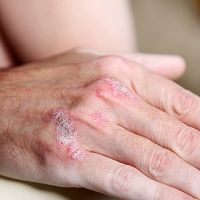Article
Psoriasis Symptoms Cleared by One New Drug?
Author(s):
The novel drug ixekizumab has been found to clear psoriasis symptoms, according to results from a clinical trial led by researchers from the University of Manchester.

The novel drug ixekizumab has been found to clear psoriasis symptoms, according to results from a clinical trial led by researchers from the University of Manchester in the UK.
Lead Researcher Christopher Griffiths, MD, BSc, MB, Foundation Professor of Dermatology, University of Manchester’s Faculty of Medical, and his team focused on testing 2,500 patients with psoriasis.
Half of the participants were administered ixekizumab once every two or four weeks, and the other half was given a placebo or another psoriasis drug, etanercept.
According to a news release that accompanied publication of the study results, the ixekizumab group exhibited rapid improvements compared with the group given placebo or etanercept. Nearly half of the patients “showed improvement as early as week four of the trial and up to 71% had shown a high level of improvement, as measured using a scale called the Psoriasis Area and Severity Index, by week 12.”
After 12 weeks of treatment, 40% of patients treated with ixekizumab had complete clearance of psoriatic plaques, with over 90% showing at least some improvement in symptoms.
Ixekizumab neutralizes the inflammatory effects of interleukin 17A, a protein which is considered to be a primary cause of the red, scaly plaques associated with psoriasis.
Dermatologists have long believed that any treatment that reduces the visible physical spots associated with psoriasis, can also aid in diminishing the mental marks thereby boosting self-esteem as well.
Griffiths noted, “What we saw in this trial was not just the physical aspects of the disease clearing up, but the people on the new drug also reporting a marked improvement in their quality of life as they felt more confident and suffered less from itching — far more than in the other two groups.”
“New drugs are fast showing us that a realistic goal for all patients should be attaining clear skin and this trial very much sets us on that path,” Griffiths concluded.
Study results were published in The Lancet.





